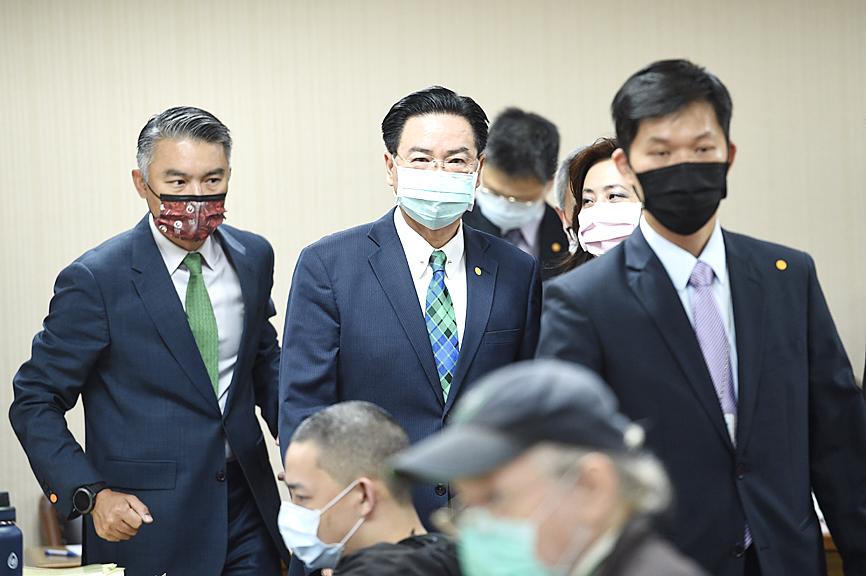The nation is to ship 150 oxygen machines to India this weekend, the Ministry of Foreign Affairs said yesterday, while confirming that talks are underway to conduct clinical trials of a domestically developed COVID-19 vaccine in Paraguay.
The ministry has since last weekend been looking for ways to help India, Minister of Foreign Affairs Joseph Wu (吳釗燮) told reporters in Taipei before heading into a meeting of the Legislative Yuan’s Foreign Affairs and National Defense Committee to report on Taiwan-Japan relations.
India has in the past few weeks struggled to contain a massive surge in daily COVID-19 cases numbering in the hundreds of thousands, with hospitals sending out urgent requests for oxygen and other equipment.

Photo: Peter Lo, Taipei Times
The government has been able to procure 150 oxygenators that have been modified for India’s voltage, which are to ship this weekend, Wu said.
It is looking to purchase more machines, as well as raw materials so that domestic manufacturers can continue production, he added.
Deputy Minister of Foreign Affairs Miguel Tsao (曹立傑) on Wednesday told lawmakers that the oxygen machines and other aid would be sent to India on China Airlines (華航) cargo flights.
This would not be the only shipment, he said, adding that the ministry would continue to provide aid on a long-term basis.
Meanwhile, ministry spokeswoman Joanne Ou (歐江安) in a statement on Wednesday confirmed media reports that Taiwan and Paraguay are in talks to conduct clinical trials for a domestically developed vaccine in the South American nation.
Paraguay is one of Taiwan’s 15 diplomatic allies and the remaining one in South America.
While receiving a shipment of Covaxin vaccines from India on Sunday, Paraguayan Expanded Program on Immunization Director Hector Castro extended special thanks to Taiwan for including Paraguay in the trials.
“Participating in clinical trials means not only contributing to science, but also guaranteeing vaccines for our country,” he said, inadvertently revealing that discussions had already begun.
Medigen Vaccine Biologics Corp (高端疫苗) and Paraguay’s National University of Asuncion School of Medical Sciences on Thursday last week held a videoconference to discuss vaccine cooperation, Ou said.
Both sides expressed a “high degree of willingness” to cooperate on conducting clinical trials in Paraguay, she added.
Medigen late last month started phase 2 clinical trials in Taiwan, administering 3,752 doses to participants.
As soon as trials enter phase 3 and it is authorized for emergency use, the nation would be happy to export the vaccine “under the principle of meeting domestic demand first,” she said.
“The government will continue to help Paraguay fight the pandemic and ensure the health and lives of Paraguayans are not used as diplomatic blackmail by the Chinese government,” she added, referring to reports that Beijing offered millions of vaccine doses in return for severing diplomatic relations with Taiwan.
The Paraguayan Ministry of Foreign Affairs last month said that some COVID-19 vaccine suppliers, whose legitimacy or link with the Chinese government has not been proven, had suggested breaking relations with Taiwan as a requirement for purchasing vaccines from China.

DAREDEVIL: Honnold said it had always been a dream of his to climb Taipei 101, while a Netflix producer said the skyscraper was ‘a real icon of this country’ US climber Alex Honnold yesterday took on Taiwan’s tallest building, becoming the first person to scale Taipei 101 without a rope, harness or safety net. Hundreds of spectators gathered at the base of the 101-story skyscraper to watch Honnold, 40, embark on his daredevil feat, which was also broadcast live on Netflix. Dressed in a red T-shirt and yellow custom-made climbing shoes, Honnold swiftly moved up the southeast face of the glass and steel building. At one point, he stepped onto a platform midway up to wave down at fans and onlookers who were taking photos. People watching from inside

A Vietnamese migrant worker yesterday won NT$12 million (US$379,627) on a Lunar New Year scratch card in Kaohsiung as part of Taiwan Lottery Co’s (台灣彩券) “NT$12 Million Grand Fortune” (1200萬大吉利) game. The man was the first top-prize winner of the new game launched on Jan. 6 to mark the Lunar New Year. Three Vietnamese migrant workers visited a Taiwan Lottery shop on Xinyue Street in Kaohsiung’s Gangshan District (崗山), a store representative said. The player bought multiple tickets and, after winning nothing, held the final lottery ticket in one hand and rubbed the store’s statue of the Maitreya Buddha’s belly with the other,

‘NATO-PLUS’: ‘Our strategic partners in the Indo-Pacific are facing increasing aggression by the Chinese Communist Party,’ US Representative Rob Wittman said The US House of Representatives on Monday released its version of the Consolidated Appropriations Act, which includes US$1.15 billion to support security cooperation with Taiwan. The omnibus act, covering US$1.2 trillion of spending, allocates US$1 billion for the Taiwan Security Cooperation Initiative, as well as US$150 million for the replacement of defense articles and reimbursement of defense services provided to Taiwan. The fund allocations were based on the US National Defense Authorization Act for fiscal 2026 that was passed by the US Congress last month and authorized up to US$1 billion to the US Defense Security Cooperation Agency in support of the

HIGH-TECH DEAL: Chipmakers that expand in the US would be able to import up to 2.5 times their new capacity with no extra tariffs during an approved construction period Taiwan aims to build a “democratic” high-tech supply chain with the US and form a strategic artificial intelligence (AI) partnership under the new tariffs deal it sealed with Washington last week, Taipei’s top negotiator in the talks said yesterday. US President Donald Trump has pushed Taiwan, a major producer of semiconductors which runs a large trade surplus with the US, to invest more in the US, specifically in chips that power AI. Under the terms of the long-negotiated deal, chipmakers such as Taiwan Semiconductor Manufacturing Co (TSMC, 台積電) that expand US production would incur a lower tariff on semiconductors or related manufacturing